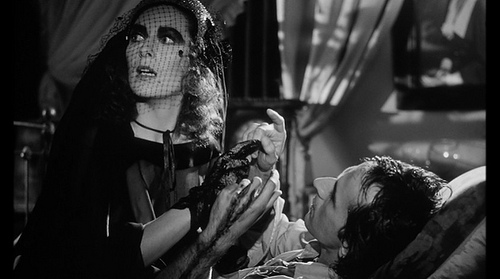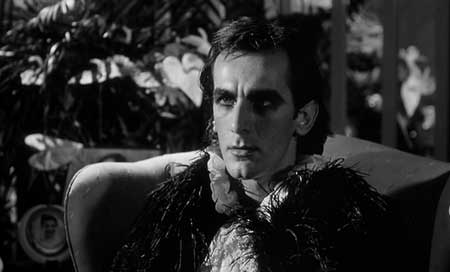It is an understatement to say that Nikos Nikolaidis’ 1990 film SINGAPORE SLING is a weird one. There isn’t any other way to describe it. A bizarro love letter to Otto Preminger’s 1944 noir classic, LAURA, SLING also acts as an imaginary sequel to Laura – if the story took an eccentric and grotesque turn. But, some form of deviance can be expected from film noir in one way or another, so Singapore Sling as an intensified example of celluloid perversion (especially compared to LAURA) seems like a natural (albeit strange) development in the genre. The film is indeed beautiful – complete with stark black-and-white cinematography – and does operate within the boundaries of certain artistic expectations, but at the same time, it breaks those boundaries and strides well beyond them. This leads the viewer into a world full of aberrant, self-indulgent madness.
A wounded detective (Panos Thanassoulis), searching for his lost love Laura, lands on the doorstep of a kooky-yet-sinister mother (Michele Valley) and daughter (Meredyth Herold) duo who take him in and torture him, play sex games with him, and plot to kill him – all with a pleasure and joy derived from a very dark place.
Let’s set the scene here and talk about that “dark place.” These two women are questionably insane; “questionably” because far be it from us to label someone as insane based on sexual expression alone. However, there is something undeniably off about the mentalities of this pair. The film opens with them digging a grave on a stormy night, dressed in frilly robes and stockings, privates fully exposed and covered in mud. They have killed their chauffeur, and are burying him in their garden. This is a recurring practice in their house; the now deceased father habitually murdered the family’s servants and “planted” them, so to speak (“He used to say corpses were the best fertilizers for the soil, and our gardenias would grow as tall as trees,” Daughter recalls.). But Father’s violent urges were apace with sexual ones, as he subjected his daughter to incestuous acts beginning at the age of eleven – abuse that, rather than traumatize her, gave her an unusual sexual appetite. And now, Father’s past abuse coupled with incestuous role playing games continually instigated by Mother results in Daughter becoming a chronic masturbator, obsessed with sex, often speaking with strange erotic excitement and dry humping whoever and whatever she can (including a very unsuspecting kiwi fruit). It’s not clear the origin of this abuse, whether Mother was an abuser herself before she met Father, or his influence corrupted her into her own kind of sexual awakening (or vice versa, for that matter), but what is clear is that Daughter has an undying admiration and fondness for her father, citing their relationship as mostly inspirational to her (“How cruel, Father, Heaven will punish us,” she says to him as he defiles her in a flashback. “My little darling,” he responds, “Heaven is the last thing that concerns us in this world.”). So, when the detective shows up at their door wounded and passive, Daughter seems just shy of elated to have a new plaything. Mother is suspicious of their visitor, knowing he’s there to investigate the disappearance of the wandering Laura (whom they had previously taken in, raped, tortured, killed, and used her viscera to decorate their kitchen), and she insists they tie him to a spare bed, keeping him there for interrogation. A quick search of his person produces a detective’s notebook and a cocktail recipe for a Singapore Sling, the name of which they use to refer to this man for the rest of the film’s duration.

The interrogation quickly turns nasty and menacing, as Singapore Sling is subjected to all sorts of torturous treatment by Mother and Daughter, including (but not limited to) binding, being urinated upon, being vomited upon, and enduring crude, outdated electroshock therapy. Singapore Sling never utters a word, remaining complicit in his suffering, and eventually becomes a seemingly willing participant in Mother and Daughter’s strange sex acts. All of this unfolds on film in a rather intriguing way; unlike other filmmakers serving us with their “gross for the sake of gross” creations, Nikolaidis has an eye for showcasing the beauty lying within the disgusting. In this way, Singapore Sling appeals to both our artistic sides and voyeuristic sides (come on, we all have them), and does something that hardly any other film does: it subverts the stigma behind the taboo, somehow making the viewer simply okay with everything.

Let’s examine why that is. First of all, it’s worth noting that some of the groundwork for SINGAPORE SLING comes from the godfather of “if it feels good, do it,” the Marquis de Sade. In a time when virtue was the basis for ordered society, Sade asserted a kind of freedom in sexuality, challenging the generally accepted philosophies of the era regarding the true nature of the self. Thomas Hobbes and Jean-Jacques Rousseau are notable here, with Hobbes’ theory of “war of all against all” outlined in his works like Leviathan (which honestly have more to do with advocating for a structure of government, but do certainly include the idea that men are intrinsically evil – an idea that alludes to the demise of mankind when we are left to our own desires and devices). Rousseau also subscribed to the “structured society” camp, but contrasted Hobbes by saying men possessed an inherent goodness that needed to be nurtured with morality. Either way, Sade disagreed on one or more parts of those philosophies (to borrow a line from his novel Justine, “An honest deed almost brought you to the gallows, a crime saved you from it. What use is good in the world anyway?”). According to him, yes, mankind is evil by nature, but in that is where we find our true selves. So, in order for us to be genuinely happy, we must be free to pursue our passions and desires, no matter how vicious or pitiless they may be. No doubt Sade’s passions and desires center famously around sexual deviance (“sadism”, duh), and this film is absolutely no stranger to that concept. What’s interesting, though, is that we, as functioning parts of a modern “civil society,” recognize the faults of Sade’s way of thinking; however at the same time, we can find a way to sympathize with him. And that’s what’s going on with Mother and Daughter in Singapore Sling. We can see very easily they are broken people, which makes forgiving their actions a bit more uncomplicated.

Singapore Sling is a transgressive film, in a very elemental sense. Using their sexuality, Mother and Daughter are acting against an institutionalized perception of morality. Their desire for dominance is not exactly unlike Sade’s bedchamber antics; the depiction of the women’s sexual expression shows us that eroticism is used in the film as an expression of personal authenticity. Everything the film presents as erotic is understood to be derived from the natural self, as opposed to resulting from external environmental forces. Further, each act these women partake in – from golden and Roman showers to binging and purging their dinners – exists within a societal taboo. And the audience can go along with this because of the transgressive nature of it all – because it’s a means to subvert a normal standard for desire. Adopting an idea from 20th century French philosopher Georges Bataille, “Desire in eroticism is the desire that triumphs over the taboo…Eroticism, unlike simple sexual activity, is a psychological quest.” SINGAPORE SLING, full of vile and disgusting activities, intrigues us. It ignites a part of us that is willing to accept this freakish behavior because we’re curious about it in ourselves. We want to embrace the sexually subversive because maybe it’ll show us a different meaning of freedom, or maybe it’ll help us let go of some form of inhibition. And here’s where a supposition of duality comes in, that each one of us has two equal but opposite personas – the acknowledgement of which provides a kind of freedom in itself. By choosing the imaginary, we can exist in a world that is separate from responsibility, which, in Sade’s school of thought, elevates oneself (later, Sigmund Freud would use a lot of these conclusions as a basis for his theory of psychoanalysis). This is what gives the film such a strange sense of morality, as we are compelled to choose whom we sympathize with. The dichotomy of Tyrant and Victim becomes blurry as we realize perhaps they’re different sides of the same coin.

But what else we have to consider is the question of perversion as a true component of freedom, or if it actually is a corruption of it. Eroticism without existential meaning is nothing more than exploitation. Celebrated existential feminist Simone de Beauvoir claims Sade mistook the spectacle of the pleasures of the flesh for lived experience, and that distinction may also be difficult to make for our femme fatales in this film (in Beauvoir’s essay “Must We Burn Sade?” she writes: “If he talked so much about his strength of soul, it was not because he really possessed it, but because he longed for it.”) The emotional intoxication produced by the erotic can lead to regrettable decisions, with rational people experiencing a crisis of conscience as an attempt to reconcile the ethics of freedom. We are driven to be responsible, whereas Mother and Daughter certainly are not. The two women are motivated only by egotistical forces, by dominance and ownership, which takes away any relevancy of their victim’s human life (one noteworthy device the film uses is keeping him silent throughout most of the picture, giving him a voice only through a limited film noir-style voice over narration). So, in this sense, Singapore Sling is acting as an audience surrogate the entire film – but especially as he exacts his revenge by the end of it.

And now let’s dive into that revenge. Singapore Sling spends most of the film passive and bewildered. He starts off the story drunk and injured, then is deprived of water and subjected to stupefying torture. But as the women begin to trust him, they relax a bit and let him eat and drink (well, more accurately, they stuff his face in a particularly repulsive dinner sequence), and he starts to regain both his physical and mental strength. Singapore Sling, still the detective, observes Daughter dropping detailed hints of resentment towards her mother, and one can only assume this is when he begins to plot his escape from the deranged pair. At this point, Singapore Sling seems to become a consenting member of this bizarre love triangle, participating willingly in their sexual debauchery most likely to gain leverage (“My job is to get out of here and take Laura with me…but until then I must do what I’m told and play the fool, which in my state needs no special effort. I spend the nights singing to myself, hoping a crack will open in my clogged up mind,” the voice over goes.). Daughter resents Mother for things as petty as not letting her smoke, but mostly for coming between her and Father. She confesses that she and Father would have killed Mother eventually (“Stupid bitch,” she addresses the audience. “Honestly someday I’ll kill her, and I won’t have anybody over my head.”). One of Father’s hunting knives goes missing one night, causing Mother and Daughter to act paranoid and suspicious of not only Singapore Sling, but of each other. The result of which is Singapore Sling manipulating Daughter by helping her kill Mother, and then turning her favorite role playing game (the one of Laura, the secretary) around on her, leading to her own gorey demise (see: Father’s missing knife). Singapore Sling escapes not unscathed, but wounded again – shot in the stomach by Daughter with Father’s luger – and possessing an even larger sense of world-weariness than when this story began. So now we ask ourselves, is this whole thing about karma? Do these women get what they deserve? Reactionary thought says “yes,” but when we consider the element of sympathy – or even empathy, at this point – these women, although obvious villains, are acting upon impulses which are generally repressed by the lot of us in the interest of maintaining an ordered society. After all, a part of Marquis de Sade’s personal philosophy was any crime committed while seeking pleasure cannot be condemned. However, as Simone de Beauvoir pointed out, eroticism without meaning is merely exploitation, and the women in this film exhibit behavior that seems to fall in the latter category. Really, more than anything, Singapore Sling seems like it could be an embellished exercise in what ultimately turns out to be nihilistic thought – something Nikolaidis does pull from his wheelhouse quite regularly.

Singapore Sling as a late-century film noir contains just as much intrigue, titillation, drama, and mystery as any other classic example of the genre. What sets it apart, though, is its subversion – its ability to transcend any uncomfortable feelings that may come with similar subject matter by treating it with a sense of pathos. Despite an at times confusing narrative, Singapore Sling is a compelling work of art that entices its audience with both sexual and intellectual stimulation (really, there’s a lot of bizarre sex in this), retaining elements of high art as it exposes some very grotesque taboos. Singapore Sling is definitely a film that’s not for everyone – except, strangely, it is. In this absurdist take on Preminger’s classic story, Nikolaidis succeeds in bringing together those otherwise opposed elements, making this film one that could resonate through the ages. It’s truly a shame that this underseen and under-discussed film is not on more film lovers’ radar.
—LORI BROOKE BARGERON
- Vampsploitation - January 15, 2018
- Hiatussploitation - December 5, 2017
- Live From Fantastic Fest, 2017 - September 28, 2017
Tags: Marquis De Sade, Nikos Nikolaidis, Sex, Singapore Sling, Transgressive

No Comments